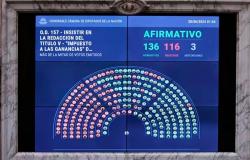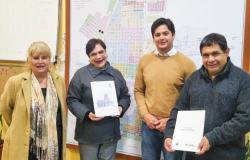21:53
A new book was recently published about the inexhaustible work of Jorge Luis Borges: “Borges and the Law” (21st Century), by Leandro Pitlevnik. The author is a doctor of Law, a regular professor at the Faculty of Law of the UBA and academic director of the Center for Criminal Execution Studies of the same higher education institution. Previously he published the novels “A Life with a Hat”, “The Bats” and “The Fishes”.
The Jorge Luis Borges Ateneo of Santa Fe (Ateneo JLB), which began its activities last April and is jointly promoted by the Galisteo Foundation, Sures magazine and the Ferrovía Bookstore, invited Pitlevnik to speak on Friday, June 27, starting at 8 p.m., in the space located at San Jerónimo 1745. Spaces are limited. Those interested can write to [email protected]. What follows is a dialogue with the author:
– Why does a jurist approach the Borgesian world?
– In truth, one could respond with another question: Why not? Fiction literature, poetry, theater, are consumed by teachers, lawyers, doctors, workers. The world of literature is there so that we can transport ourselves to wherever we want or go inside, regardless of our job or profession. Borges’ worlds have such a particular construction and aesthetic that it seems difficult not to have noticed them. In my case, I rather immersed myself in stories, in libraries, lotteries, gardens, the betrayals and loyalties that he resorts to to tell the world and that reflect something of the way in which we establish rules to manage our coexistence as best as possible. .
– Is there a dimension in Borges’ literature that is related to law?
– From my perspective yes. On the one hand, there are fictions in which dystopian societies unfold where chance or the impossibility of knowing reality suffocates its inhabitants and that allow us to think of smaller matrices that we also recognize in our own community. Saturated by excess rationality or by the impossibility of being understood, they somehow represent some of the fears that we not so unusually perceive in everyday life. On the other hand, the way in which victim and perpetrator are confused, the notions of betrayal and loyalty in many of his fictions or the detailed construction of a police story are, in short, scenarios that may well be crossed by the justice system or the regulations that we give ourselves for specific cases with the intention that they improve us as a society.
-Does Borges enable legal people a different vision?
– Borges pointed out the creative instance of reading. He is the one who reads who provides a particular meaning to what he reads. The idea is wonderful and at the same time it is not absolute, because if it were it would eliminate all value from the written text; but it is evident that it always depends on the person reading. In the case of Borges’ narrative prose, in my opinion, there is a richness or, continuing with the concept of reading, there is a source ready for the reader, a skillful springboard to go beyond the written letter, which easily It allows different perspectives. In that sense, regarding law, which sometimes seems so formally constructed, so alien, I understand that it contains other perspectives, richer, more useful.
The meaning that my thesis had and that I tried for the book to reflect, is not to draw conclusions from Borges or to try to be the authoritative voice of a supposedly true message of his books, but rather, that reading enriches the process by which we think about our universe and its rules. Some of the conversations that gave me the most satisfaction after publishing “Borges and the Law” are those I had with professionals whom I admire and they told me that reading them allowed them to think about the way in which they argued in a trial or, in another case, which reminded him of certain initial readings, the depth with which, based on a reading of Kafka decades ago, that person had found his vocation for public defense. I mean that the book bore the traces that reading other fiction itself had led someone to find themselves with a vocation to defend the most vulnerable in the face of the criminal justice system.
-What has been your relationship with Borges?
Although my age would have allowed me to meet him, I never saw him. I did not attend his lectures. Perhaps as a child I could have seen an interview on television, or repeated that very Argentine myth of the injustice with which the Swedish academy denied him the Nobel Prize that, we say, he deserved more than anyone else. As Piglia makes a character in Artificial Respiration say (and I reproduce it as a section of the book), imagining that Borges does not exist is like pretending that the Rio de la Plata does not exist either and that we can walk to Uruguay. The relationship with Borges is that of a magnet that attracts discussions, which seems to become unavoidable when we address literary discussions and many others that exceed the literary.
– What can you tell us about the genesis of your book “Borges and the Law” and your journey?
– After working a lot on his stories, thinking about legal problems through his fictions (Jaime Malamud Goti, Martín Farrell, Martín Bohmer, are some of the jurists with whom I had the fortune to meet, debate, teach or attend seminars) , the possibility of it becoming the topic of my doctoral thesis became a natural consequence. A friend lit the spark several years ago when he asked me why he didn’t definitively unite both worlds in a doctoral thesis and the process was definitively launched. I had the opportunity to travel to Pittsburgh where the Borges Center operates, directed by that enormous and generous intellectual Daniel Balderston, I studied and participated in seminars there.
The libraries dedicated to Borges are almost a reproduction of his cyclical library of Babel, there is everything for everyone, so I did nothing more than read his texts and read what many and many academics said about them. A certain literary critic that I admire (Sarlo, Barrenechea, Piglia, Ludmer, Molloy, Balderston himself) often works in a space that, I believe, is bordering on me: the idea of the State, representations, Borges’ readings about the past. Argentine, about Nazism or Peronism. Perhaps my place in that universe in which I am not trying to compare myself, but rather to bring together a point of view, is to join the points that, from the most limited perspective of the law, create other constellations.
-What is the Borgesian text that you consider closest to the problems of law?
– When we go to a play so much, it happens to us like in everyday life with the characters of a series that we cannot stop watching. Our preferences vary depending on the season. The same thing that since we were kids, I think, happens to us with Mafalda. For a while we have more fun with Susanita, then Manolito, then Libertad or we return to Mafalda as a favorite. Perhaps it is a consequence of what we mentioned before, regarding the creative factor of each one in the act of reading. I would say that one of the ones that I have most present these days is “The Theologians”. In it appear the attribution of truth, denunciation, betrayal, punishment, guilt, the exercise of judging. For a long time I focused on “Pierre Menard, author of Don Quixote”, for his representation of the way in which we read a text and the reflections that from it open the door to different interpretations of legal texts.
– Why should a lawyer read Borges?
– We go back to the beginning… Why not? Perhaps the word “duty” is a bit strong, but on that train, I think we should all allow ourselves to take a chance with his texts. Because they do well, just for that reason.






